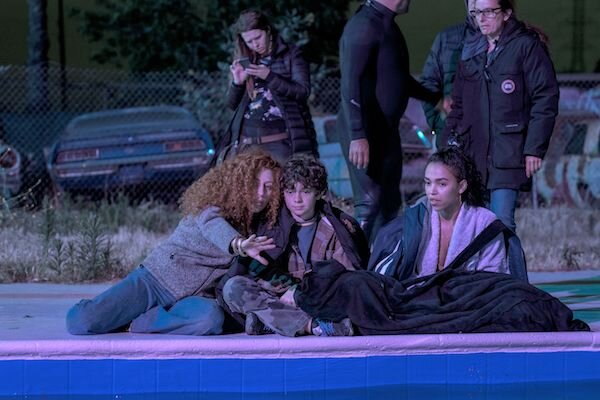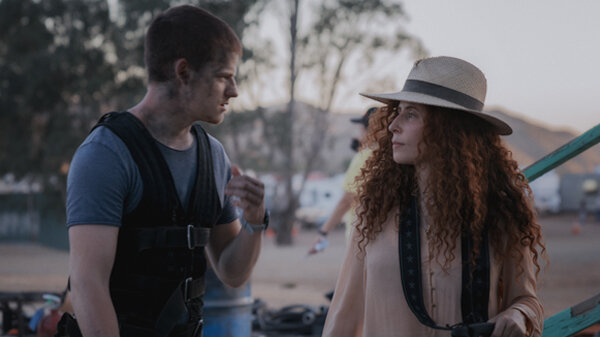Alma Har’el has spent years working behind the scenes on every form of visual and sonic art. With her debut narrative feature, Honey Boy, the filmmaker turns her talents to one boy’s story. Ella Kemp interviews Har’el about her experience framing masculinity, playing chess, and understanding dreams.
Sometimes when you interview a person you admire, it can feel like the meeting never happened. You mechanically did your duty, asked your questions, and they did theirs, answering politely. Minds can feel worlds away, a handshake can hold little tactile feeling. It’s as though there’s some kind of gauze between the journalist and the artist, where neither party dares step over the line to actually connect. Alma Har’el would never let this happen. From the little time I spent with her, she struck me as an immensely dedicated person. She’s a wise, thoughtful artist. In her mission to create opportunities for artists with her talent discovery platform Free The Work, and every loving detail that pours from her online presence, Har’el works selflessly. With Honey Boy, all these ideas come together – creating a sensitive, deeply stirring portrait of youth in transition.
Ella: When Shia sent you the script for Honey Boy, what was the first thing you felt?
Alma: I really felt like I could just see it. He also sent me a photo of him and his father, and I felt like I could see his whole childhood just from reading it, even though it was a small part. It brought up memories with my own father, which were very different, but had some similar challenges because my father is an alcoholic. It’s funny, because you can often hear ‘he was an alcoholic’, but an alcoholic is something for life – so he’s an alcoholic now too. It made me feel like this was a project that I had to make, together with Shia, and that he should play his father too. Shia playing his father was a huge part of what made this special.
He didn’t originally want to act in it – it was your idea. How did you convince him?
It was a chain of emails and texts at that point, because he was still in court-ordered rehab. He really believed that he would never act again, that no one would let him do another role because of what happened. I just said that he had to tell his story. Playing his father had the potential to be a cinematic exorcism, to pool out of him everything that needed to get out. It would also offer an opportunity for people to really see something that they’ve never seen before. I don’t think I’ve ever seen anybody play their own father.
Neither have I.
It was clear it should happen, and he agreed we should do it – he just didn’t have faith that we could; that we could get the financing. It was up to me to go get it, which we did. I showed it to my producers and they all jumped in. We started pre-production by the time he was out of rehab.
I’m always curious about stories about masculinity being directed, shot, edited by women. Are you conscious of the female perspective when choosing how to bring this to life?
We’ve all been brainwashed by the white male gaze for decades. There’s a misconception that the biggest benefit for our society, if people would see more stories of people of colour and of women, would be that we would benefit from hearing those stories, which is true, because those stories don’t get told enough. There’s not enough stories about women as subjects and not objects. And it’s the same thing with people of colour, which we’re finally seeing more of. But I think that what we’re forgetting sometimes is that boys and men themselves have been creating a society that is dominated by a lot of masculine ideas, built for men in many ways, and it helps the promotion of their success.
A lot of that comes because they haven’t seen themselves through other eyes. They see themselves through other men’s eyes, often alpha males too. I think that by telling a story like this, one that deals with the expectations of masculinity, the performance of masculinity, the toxic aspects of the expectations and how men pass that to their sons, when it’s being filmed by an incredible cinematographer like Natasha Braier, or edited by a woman like Monica who edited our film together with Dominique, and directed by me, it definitely offers a crew that’s bringing another perspective to those stories that can show some of the blind spots we all have.
You’ve mentioned your father taught you to play chess. My dad has always tried to teach me, and I don’t play. It’s a big disappointment for him. He’s always said, dramatically, “If you can play chess, you can play life”.
It’s really annoying when people impose things on you, it makes you resist them. My father never told me that if I can play chess I can have any benefits in life, he was just enamoured with the game and enjoyed the emotional and cerebral exercise that it presents. He played with me and my brother a lot when we were young. My father was very, very critical – it sounds like yours too.
Jewish fathers…
Right! He could definitely give you the feeling that you've ruined everything if you didn’t do something right or didn’t say the right word. But he also passed a huge love to me for this game. I feel like over the years I’ve really used the strategic thinking that comes with chess, like, taking care of your soldiers. I didn’t go to the army, even though I grew up in Israel. I was found unfit to take orders. So I’m not an army person, but I do recognise the strategy of the board and the fun of trying to trick the other person and doing things they can’t see, catching each other and laughing about it. It was really fun. It’s something we still do when I go to Israel, we have a board and we go and sit in a coffee place or in a park and we play. When I think about all the stuff I actually do through work and with my non-profit for women directors, I see how I approach the whole marketplace, the whole advertising world and how I understand who is the king, who is the queen, who does what. How can you disrupt the whole thing? All these things feel like a chess game.
I definitely will learn to play one day.
You don’t have to! You probably have your own way of learning those same lessons. Everybody has their own way of learning things – there’s no one thing you have to do.
Growing up in Israel and now working in America, what differences have you found?
It was very different when I was there in terms of what I was doing. I was hosting a National Geographic TV show and directing it. And then I was hosting other shows and editing trailers, trying to survive making money doing that. My biggest passion was making video art, and performing in clubs with EDM music and other musicians on stage and cutting my own pieces with live performance. I learned a lot from video art, in terms of how to look at images and filmmaking as a transition of energy, and how images hold a certain power on other people’s psyche, how it can make them feel a certain way in real time.
Editing trailers, where you need to cut the best moments of a film and find the shortest way of telling a story, that’s an amazing exercise because you get to watch so many films and find how to market them, but also you see what ends up sticking out, and what subtlety is going to get lost when it comes to the trailer, and how the film can’t only be made of these trailer moments – it’s the combination of those things together which makes a great film. I didn’t have much knowledge of the industry at all, and when I came here I really had to struggle for many years just doing music videos and figuring out how to break in. Documentary films were my film school, my entry into everything.
How did you find the leap into fiction with Honey Boy?
I’ve been really lucky that I actually didn’t go to film school, so one thing was built over another. It was really organic. I went from video art to editing to working in post-production for a while. I just did so many jobs, so when I came into my first scripted film I felt like I had so much knowledge. All of my experiences served me in different ways. The biggest challenge was how to work with the bureaucracy of making a film. How to work with unions, the planning of shooting a film in 21 days, which is a huge challenge. Going from shooting a one-minute commercial for $2 million to doing an hour and a half for not a lot more is really the hardest thing.
Your work toes the lines between reality and dreams. I felt this a lot while watching Honey Boy – there’s a hazy aura around it. How do you define these boundaries?
I don’t know if I’m a very dreamy person. I can be practical, but I definitely experience life as very dreamy. I have in my own psyche a lot of limitations, in terms of memory. A lot of things escape me when I look at my own life. I have what I think they call spatial dyslexia, which, don’t laugh, but it’s a thing that makes you not able to remember directions and not know where you’re going specifically, so you get lost very easily.
There’s something dreamy about knowing people. There’s something dreamy about time. There’s something dreamy about feelings, and the way they come and mean so much, and then go away. There’s a way to puncture that by being present, which is a really incredible experience that I strive for all the time. I sometimes feel like I’m stepping out of a dream, and there’s a bit of a battle sometimes between having the clarity of the present moment that feels timeless, and then the dreaminess of memory and time. I try to capture all of that.
Ella Kemp (@ella_kemp) is a film critic and editor based in London. She is the Contributing Editor for READ ME and can also be found at Culture Whisper, the Quietus, Little White Lies, Empire and more. Her favourite word is “verklempt” because it’s what she often is.
Our ALMA HAREL t-shirt is available to purchase here. Proceeds go towards paying our writers and supporting female-led film projects.



